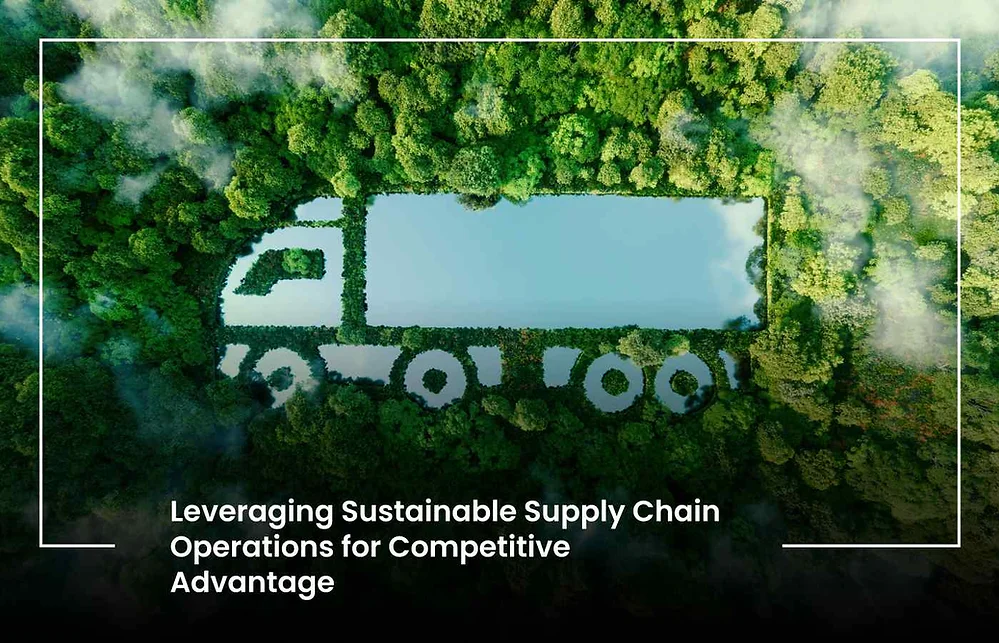In recent years, sustainability has emerged as a critical driver of success. Organizations recognize the importance of integrating environmental, social, and governance (ESG) principles into their business operations, including sustainability in supply chain operations. Sustainable practices are instrumental in meeting regulatory requirements.
This blog post will explore how sustainable supply chain operations can give a company a competitive edge.
The Rise of Sustainable Supply Chain Operations
A sustainable supply chain refers to one that integrates ethical and environmentally responsible practices at every stage. The primary goal is to meet ESG standards. Adopting sustainable practices should extend from raw material sourcing to last-mile logistics, product returns, and recycling processes.
Over the years, the expectations of businesses and end customers have evolved. Consumers increasingly seek products and services from companies committed to environmental stewardship, social responsibility, and ethical business practices.
What are the three elements of sustainability, and how can a company incorporate them?
Three elements of sustainability are environmental, social, and governance frameworks.
1. Environmental Sustainability
The environmental objectives of a sustainable supply chain are efficient natural resource utilization, reduced waste generation, minimized pollution, and a reduced carbon footprint.
There are several methods and models to address environmental concerns. Some examples are
· Energy-efficient systems
· Waste management
· Water conservation
· Green Transportation
· Product lifecycle management
· Research on eco-friendly products and more
Digital supply chain technologies, including big data management, advanced analytics, artificial intelligence (AI), and security tools, have significantly improved supply chain management.
An area where AI has a significant impact on logistics is route optimization. AI algorithms analyze data on traffic patterns, road conditions, and delivery schedules to optimize the most efficient route for delivery drivers. This reduces fuel costs and carbon emissions and ensures timely delivery of goods.
An American logistics company, UPS, adopted an AI-powered route optimizer that minimizes the number of turns their vehicles take during delivery. The software saves the company 10 million gallons of fuel per year. In addition to the cost savings, it reduces carbon emissions by 100,000 metric tons annually.
2. Social Responsibility
At its core, the social aspect of ESG is about how a company contributes to society. Some of the ESG aspects include
· Employee relations: diversity, employee safety, benefits, policies
· Product liabilities: product safety, chemical safety, privacy, and data security
· Product development for societal benefits through research and development
· Responsible investment
Diversity in the workplace can extend to embracing people of all races, genders, cultures, disabilities, and sexual orientations.
While there are many examples, we would like to mention the efforts of Ford Motor Company, a well-known automobile major focusing on pay equity. They are conducting a diversity, equity, and inclusion audit and introducing a global salaried pay ratio to level the playing field for all employees.
3. Governance and Ethical Practices
Attaining sustainability in the supply chain is complete only with stringent governance guidelines, protocols, and implementation.
Governance factors include business ethics, risk and crisis management, resource allocation, incentive structures, transparency, tax strategy, human rights compliance, and anti-corruption.
For example, one way can be the ethical sourcing and procurement activities by prioritizing, evaluating, and assessing the supplier’s ethics. It also includes communicating internal expectations to suppliers, evaluating their performance in ethics, conducting factory audits, providing incentives for positive development, running supplier development programs, and signing collaboration agreements.
How can Sustainable Supply Chain Operations Provide a Competitive Advantage?
Enhanced Brand Reputation
Sustainable practices demonstrate a company’s commitment to environmental and social responsibility, which can positively impact its brand reputation. Consumers are more likely to support businesses that align with sustainable practices. It increases customer loyalty and positive word-of-mouth.
Cost Reduction and Efficiency
ESG-compliant supply chain operations often involve optimizing procurement processes and increasing operational efficiency. By embracing eco-friendly initiatives, organizations can drive cost savings through reduced energy consumption, effective resource utilization, efficient waste management, and streamlined logistics. These cost efficiencies contribute to improved profit margins and long-term financial sustainability.
Supply Chain Resilience
ESG-compliant practices help organizations build resilient supply chains that adapt quickly to changing market dynamics and unforeseen disruptions. They also support companies to diversify their supply network, investing in renewable energy sources, and implement responsible sourcing strategies.
Access to New Markets and Business Opportunities
Sustainable supply chain operations help businesses to expand their market. It contributes to building their credibility for new investments and partnerships.
Organizations that commit to ESG are more likely to secure lucrative contracts and partnerships. Business ties with these entities create new revenue streams and business growth.
Conclusion
Adopting Sustainable Supply Chain Operation practices based on ESG frameworks is no longer just a regulatory requirement; it has become a strategic imperative. Sustainable supply chains offer a more sustainable future and a competitive advantage in today’s rapidly evolving business landscape.
Our effort goes beyond assessments and internal investigations related to ESG compliance. AccelESG is committed to offering ESG-related assessments and management services to accelerate our clients’ sustainability journey. Visit us to know more. (https://www.accelesg.com/ esgjourney).

